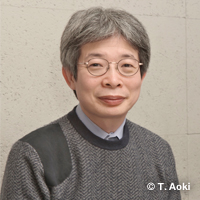Title of Presentation
“Theater as a Communication Device”
The performing arts—theater and dance—probably have about as long a history as primeval humans, and in addition to the enjoyment it provides in and of itself, it also offers a variety of incidental social functions.
I would like to offer some thoughts here about one aspect of those functions in particular, the role of the performing arts in building, maintaining, and reviving communities, looking at the issue from two main perspectives.
The first is the issue of communication. Among all living creatures, humans are the only ones who belong to two kinds of groups: a “family” and a “community.” Gorillas stay in family units while chimpanzees stay in community units, but humans go back and forth between the two. To do so, we are compelled by the need to convey something to others.
If the members of a community always had the same type of experiences, then there would be no such need, but we humans alone must convey to others such ideas as “Who was successful in hunting today?” or “What issues are occurring within the household at the moment?” Naturally, there are better or worse ways that emerge when conveying such information. It begins with conveying what sort of prey was caught, giving sound to the color and shape, and eventually that becomes abstract and is sublimated as art.
The second point is the question of consensus building. When people with different values form a community, or when multiple families form a collective group, we must always carry out some form of consensus building. In many cases, public entertainment such as the village festival was probably a rite of passage for that purpose. Once you become a certain age, you are involved in festival preparations, which take one or two months, letting you experience collaborative work with adults outside your family. In the days when there was no school education, these festivals were also an important educational institution for maintaining the collective.
In this lecture, after offering my reflections on this type of social role of the performing arts, I will also report on the current status of cutting-edge communications education in Japan.
Profile
- Web Site URL
- http://www.seinendan.org/eng/
- A brief Biography
-
Playwright, director, and leader of the Seinendan Theater Company. Artistic director of the Komaba Agora Theater. Artistic director of the Kinosaki International Arts Center. General manager of the Cultural Centre of Fujimi City, KIRARI FUJIMI in Saitama Prefecture.
Born in Tokyo in 1962. Graduated from the Humanities Division, College of Liberal Arts, International Christian University. Hirata served as a professor at J. F. Oberlin University and at the Osaka University Center for the Study of Communication-Design, and currently serves as a specially appointed professor at the Osaka University Center for the Study of CO Design, research professor at the COI Research Promotion Office of Tokyo University of the Arts, visiting professor and special advisor to the president at Shikoku Gakuin University, and visiting professor at Kyoto Bunkyo University. Hirata is president of the Japan Performing Arts Foundation, advisor on cultural policy for Toyooka City in Hyogo Prefecture, director of education and cultural community building for Nagi in Okayama Prefecture, municipal government advisor to Fujimi City in Saitama Prefecture, an executive board member of the Japanese Society for Theatre Research, and a board member of the Japan Foundation for Regional Art-Activities.
- Details of selected Awards and Honors
-
1995 39th Kishida Kunio Drama Award for Tokyo Notes 1998 5th Yomiuri Theater Awards for Outstanding Director and Best Play for his production of The Cape of the Moon 2002 9th Yomiuri Theater Award for Outstanding Play for his play Attacking Ueno Zoo for the Fourth Time (screenplay, composition, direction) 2002 AICT (Association Internationale des Critiques de Théâtre) Critique Award for his book Arts as the Basis of a Nation (Shueisha Shinsho) 2003 Winner of the Grand Prix of the 2nd Asahi Performing Arts Awards for his play Across the River in May, a project of the Year of Japan–ROK National Exchange in 2002 2006 Montblanc de la Culture Arts Patronage Award 2011 Awarded the Chevalier of the Order of Arts and Letters by France’s Ministry of Culture - A list of selected Publications
-
Oriza Hirata’s Works: For Contemporary Colloquial Theater (Banseisha)
Oriza Hirata’s Works 2: Cities Need No Festivities (Banseisha)
Introduction to Theater (Kodansha Gendai Shinsho)
Acting and Directing (Kodansha Gendai Shinsho)
Arts as the Basis of a Nation (Shueisha Shinsho)
The Map-Creating Journey (Hakusuisha)
To Compete with the World (Tokuma Shoten)
Creating a New Space—Introductory Outline of Citizen Arts (Iwanami Shoten)
From Not Understanding One Another (Kodansha Gendai Shinsho)
Going Slowly Downhill (Kodansha Gendai Shinsho)






